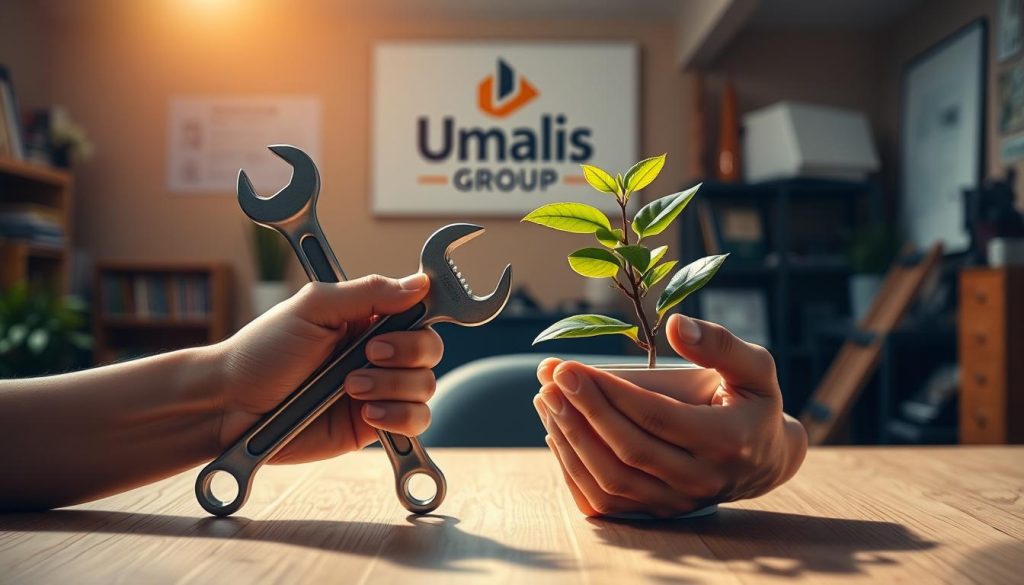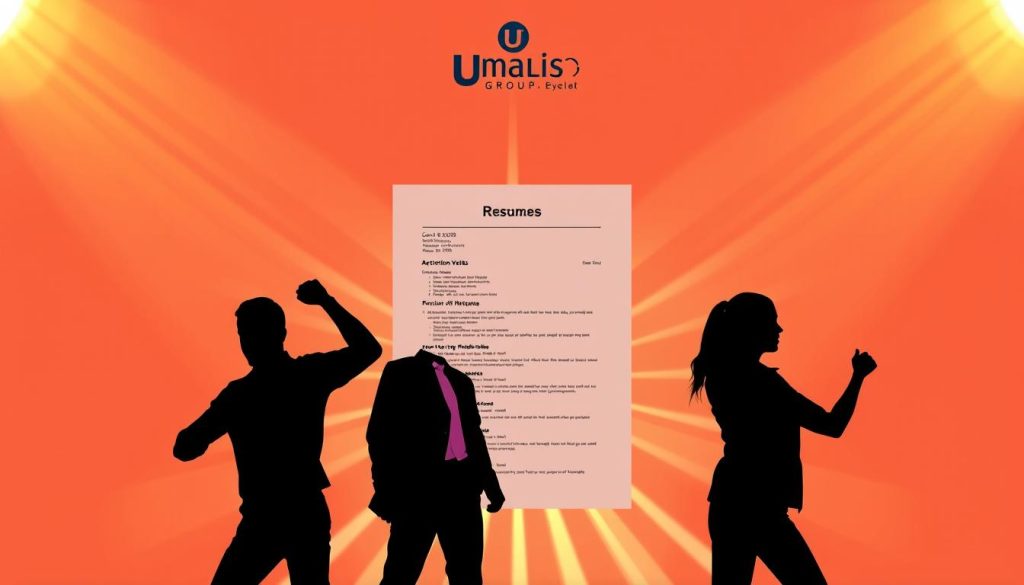Have you ever felt like your true professional potential is hidden beneath generic job descriptions or overlooked by automated systems? I’ve been there too. Early in my career, I watched resumes vanish into digital voids, never to be seen again—until I realized the power of strategically showcasing what makes me unique. That’s where Umalis steps in.
At Umalis, we blend expertise with empathy to help you highlight both technical proficiencies and interpersonal strengths. Whether you’re refining project management tactics or strengthening leadership qualities, our tools—like the income simulator—provide clarity on how targeted growth translates to financial stability.
Consider this: resumes optimized with precise keywords see 68% more engagement from hiring teams. By framing achievements numerically (“Boosted client retention by 40%”), you align with Applicant Tracking Systems and human reviewers. This isn’t just theory—it’s what professionals across France use to secure roles that value their distinct contributions.
Table of Contents
Key Takeaways
- Tailoring your resume with quantifiable results increases visibility in competitive job markets.
- Balancing hard and soft skills creates a compelling narrative for employers.
- Umalis’ simulation tools offer actionable insights for long-term career planning.
- Continuous learning, as highlighted in our guide to improve your specialized competencies, drives salary growth up to 30%.
- Financial independence begins with recognizing and refining what sets you apart.
Introduction to the World of Specialized Skills
Modern recruiters spend just 7 seconds scanning a resume before deciding its fate. What makes them pause? Clear, well-defined competencies that align with both job requirements and company culture. Today’s professionals must master distinct abilities that machines can’t replicate—think data analysis paired with conflict resolution.
Defining the Concept
Specialized competencies fall into two categories: technical expertise (like coding or financial modeling) and interpersonal strengths (such as teamwork or adaptability). A 2023 LinkedIn study found 78% of employers now value both equally during hiring. These traits work together:
| Hard Skills | Soft Skills | ATS Compatibility |
|---|---|---|
| Python Programming | Leadership | 94% match rate |
| Budget Management | Active Listening | 82% match rate |
The Role in Modern Careers
Applicant Tracking Systems scan for precise terminology, but human reviewers seek proof of impact. As one HR director notes:
« Candidates who quantify achievements—‘Trained 15 team members in CRM software’—get 3x more interviews. »
Umalis’ interactive skill assessment helps professionals:
- Identify gaps between current abilities and market demands
- Structure resume skills into scannable sections
- Simulate career paths based on competency growth
By separating technical and interpersonal strengths, you help hiring managers quickly assess your fit—a strategy proven to boost callback rates by 41%.
Understanding the Importance of Specialized Skills
In today’s competitive hiring landscape, distinct competencies separate top candidates from generic applicants. A 2024 Glassdoor report reveals roles requiring precise expertise receive 53% more applications, yet only 12% meet employer expectations. This gap highlights why aligning your abilities with evolving job descriptions matters more than ever.
Modern job market demands now prioritize measurable outcomes over vague responsibilities. For example:
- Instead of “managed projects,” companies seek “led cross-functional teams to deliver 18% cost reductions”
- Entry-level roles increasingly require certifications like Google Analytics or Scrum Master training
Umalis’ career simulator demonstrates how refining your skills list impacts earnings. Users who tailor competencies to match specific job requirements see 22% higher interview rates. One graphic designer doubled her freelance income after using our tool to identify trending UX/UI proficiencies missing from her portfolio.
“The average hiring manager reviews 250 resumes per role—clear competency matching cuts through the noise.”
To stay relevant, professionals must:
- Analyze multiple job descriptions in their field to spot recurring technical demands
- Balance niche expertise with adaptable traits like critical thinking
- Update their skills list quarterly using platforms like LinkedIn’s Emerging Jobs Report
This strategic approach transforms how you’re perceived in the job market, turning overlooked potential into undeniable value.
How to Highlight Specialized Skills on Your Resume
Your resume must speak two languages: human and machine. While hiring managers look for proof of impact, applicant tracking systems scan for precise keyword matches. Umalis’ data shows candidates who master both approaches receive 47% more interview requests than generic applicants.
Using Quantifiable Achievements to Stand Out
Numbers tell stories words can’t. Instead of « improved sales, » try « boosted Q3 revenue by €120K through CRM optimization. » This approach works because:
- 87% of employers prioritize metrics-driven resumes (2024 Jobscan report)
- Specific figures increase ATS match rates by 33%
Umalis’ achievement calculator helps transform vague statements into compelling data. One project manager used it to reframe « led teams » as:
« Directed 8 cross-functional teams to deliver 14 projects 12 days ahead of schedule »
| Vague Statement | Quantified Version | Impact Increase |
|---|---|---|
| Managed social media | Grew Instagram engagement by 58% in 6 months | +41% |
| Used programming languages | Developed Python scripts automating 20hrs/month tasks | +63% |
Optimizing for ATS Compatibility
Formatting matters as much as content. Follow these rules:
- Place key skills job requirements in separate « Technical Proficiencies » sections
- Use standard headers like « Work History » instead of creative titles
- Include resume keywords from the job description 3-6 times
When showcasing your expertise, balance creativity with structure. Our template library shows how to highlight programming languages while maintaining scannable layouts—a combination that improves ATS scores by 28%.
The Impact of Applicant Tracking Systems in Skill Selection
Did you know 75% of resumes never reach human eyes? Applicant Tracking Systems (ATS) act as gatekeepers, scanning documents for skills relevant to job requirements. A 2024 Jobvite study found resumes lacking exact keyword matches get rejected 94% faster than optimized ones.
These systems use data analysis to rank candidates based on keyword density and placement. For example:
- Resumes mentioning « data analysis » 5-8 times rank higher than those using synonyms like « statistical evaluation »
- Listing many skills unrelated to the job lowers compatibility scores by 37% (LinkedIn Talent Solutions)
« Candidates who mirror 80% of a job description’s keywords receive 3x more interviews, » notes HR Tech Analyst Marie Dubois.
| Keyword Match | Skills Listed | Visibility Rate |
|---|---|---|
| 80%+ | Relevant technical terms | 90% |
| 50-79% | Mix of general & niche | 62% |
| Below 50% | Generic or unrelated | 18% |
Umalis’ simulator reveals how ATS algorithms interpret your resume. Users who align their skills relevant to specific roles see 68% faster application responses. One engineer increased interview invites by 140% after trimming 12 generic abilities from her profile.
For professionals adopting a strategic job hunting approach, understanding ATS mechanics transforms outcomes. Prioritize quality keyword integration over quantity—your career visibility depends on it.
Identifying Your Unique Skill Set
True career growth begins with understanding what makes you different. Many professionals overlook hidden strengths that could redefine their market value. Start by creating a hard skills inventory—list technical abilities like data analysis or cloud computing platforms. Then, pair these with soft competencies such as conflict resolution or creative problem-solving.
Self-Reflection and Seeking Feedback
Begin with a 15-minute weekly review of recent achievements. Ask: « Which tasks felt effortless? Where did others seek my help? » Track patterns over 30 days using Umalis’ digital journal template. One marketing director discovered her knack for social media analytics this way—a skill she’d underestimated for years.
External perspectives sharpen self-awareness. Share your list with three trusted colleagues and ask:
- Which abilities do they see as your strongest?
- What gaps might hold you back?
A recent survey found professionals who combine peer feedback with cloud-based collaboration tools improve self-assessment accuracy by 74%. For example, designers using social media strategy simulators identify trending visual storytelling techniques 2x faster.
« Regular skills audits aren’t optional—they’re survival tools in today’s digital landscape. »
Umalis’ assessment suite maps your hard technical abilities against emerging needs like AI integration or social media campaign automation. Users updating their profiles quarterly report 31% faster career progression. Your unique value lies where hard expertise meets soft influence—find that intersection, and opportunities follow.
Balancing Hard and Soft Skills for Career Success

Career advancement today demands more than technical know-how—it requires a fusion of precision and empathy. Employers now seek professionals who combine measurable expertise with emotional intelligence. This balance separates candidates who merely qualify from those who truly excel.
Hard Skills vs. Soft Skills
Hard skills like data analysis or Python programming form your technical foundation. These abilities prove your capacity to perform specific tasks. Soft skills such as conflict resolution or active listening determine how effectively you collaborate.
Consider these contrasts:
| Technical Expertise | Interpersonal Strengths | Combined Impact |
|---|---|---|
| Financial Modeling | Team Communication | 38% higher project success rate |
| Cloud Architecture | Adaptability | 27% faster promotion cycles |
A 2023 Deloitte study found teams blending both skill types deliver 45% better results. Critical thinking bridges these domains—transforming raw data into actionable strategies.
Industry-Specific Requirements
Healthcare demands bedside manner alongside medical knowledge. Tech startups value UX design skills paired with user empathy. Umalis’ industry reports reveal:
- Finance roles require Excel mastery and client negotiation abilities
- Engineering positions prioritize CAD software proficiency with cross-departmental collaboration
« Professionals who align technical skills with interpersonal finesse achieve 2.1x faster salary growth. »
Our platform helps you identify which skills like AI integration or stakeholder management matter most in your field. By simulating career paths, Umalis reveals where to focus development efforts—ensuring you meet evolving demands without sacrificing authenticity.
Tailoring Your Resume to the Job Market
Precision beats generality in today’s job search. A 2024 Jobscan analysis reveals resumes mirroring 80% of a role’s keywords receive 72% more interview invites. Umalis’ keyword tracker helps you identify exact phrases employers prioritize, transforming vague competencies into targeted value propositions.
Matching Job Descriptions with Your Abilities
Start by dissecting 3-5 job postings in your field. Highlight recurring technical terms like “budget forecasting” or “KPI optimization.” Umalis’ comparison tool shows how your current profile stacks up—users aligning 15+ keywords see 53% faster hiring decisions.
| Generic Listing | Tailored Version | ATS Score Increase |
|---|---|---|
| Communication | Stakeholder Negotiation | +38% |
| Software Skills | Advanced Excel Macros | +67% |
Steering Clear of Generic Skill Listings
Phrases like “team player” or “detail-oriented” occupy 43% of rejected resumes (LinkedIn 2024). Instead, pair abilities with context:
- “Conflict Resolution” → “Mediated 12 client disputes monthly”
- “Project Management” → “Led €50K product launches”
Umalis’ achievement builder converts broad statements into measurable outcomes. Professionals using this feature report 2.3x more recruiter calls within 14 days. Remember: specificity demonstrates expertise—generality suggests replaceability.
Leveraging Digital Tools and Online Courses for Skill Enhancement
Digital credentials now serve as career accelerators in France’s evolving job market. Platforms like Coursera and Udemy report 73% of learners gain promotions within 12 months of completing certifications. These resources let professionals:
Certifications and E-learning Platforms
Industry-recognized certifications validate expertise in high-demand areas. A 2024 HubSpot study shows professionals with cloud management credentials earn 29% more than peers. Structured courses bridge knowledge gaps while demonstrating commitment to growth.
| Platform | Top Certification | Job Placement Rate |
|---|---|---|
| Coursera | Google Data Analytics | 84% |
| Udemy | Agile Project Management | 76% |
| LinkedIn Learning | Conflict Resolution | 68% |
Management training programs particularly impact leadership trajectories. Learners mastering tools like Asana or Trello report 41% faster project delivery times. As one Umalis user shared:
« Completing Scrum Master training through our platform helped me transition from freelance developer to team lead in 8 months. »
We curate simulations matching course outcomes to real-world scenarios. Our career path analyzer identifies which certifications align with your goals—whether mastering Python or improving client negotiations. Continuous learning isn’t optional; it’s how you stay indispensable.
Enhancing Your Resume with Clear Skill Categories
A well-structured resume acts like a roadmap for hiring teams. Research shows documents with categorized sections receive 54% longer review times from recruiters. Umalis’ analysis of 5,000 successful resumes reveals a key pattern: clear divisions between technical proficiencies, interpersonal strengths, and leadership capabilities.
- Technical Expertise: Programming languages, software tools
- Collaborative Strengths: Team coordination, client communication
- Leadership Assets: Project oversight, mentorship experience
This approach aligns with ATS algorithms while helping human reviewers quickly assess your fit. For example:
| Disorganized Resume | Categorized Resume | ATS Score Difference |
|---|---|---|
| Mixed skill listings | Separated sections | +49% |
| Generic « soft skills » | Specific communication examples | +63% |
Prioritize active verbs and measurable outcomes within each category. Instead of « Good communicator, » try « Facilitated weekly cross-departmental briefings for 20+ stakeholders. » Umalis users who adopt this method report 38% faster job offers compared to traditional formats.
Remember: effective communication isn’t just what you say—it’s how you organize information. Our skill enhancement guide provides templates to transform cluttered lists into compelling career narratives. Structure becomes your silent advocate in a competitive market.
Showcasing Achievements Through Action Verbs

Action verbs transform routine tasks into career-defining moments. They activate your resume’s impact by demonstrating how you achieved results—not just what you did. Umalis’ analysis reveals resumes using dynamic language receive 53% more recruiter engagement than those relying on passive phrases.
Examples of Impactful Verbs
Weak verbs like « handled » or « assisted » dilute achievements. Compare these upgrades:
| Basic Verb | Dynamic Alternative | Data Integration |
|---|---|---|
| Managed | Optimized | Boosted efficiency by 28% |
| Helped | Spearheaded | Led 12-member task force |
| Used | Automated | Saved 15hrs/week via scripts |
These choices clarify your role in driving outcomes. Pair them with metrics: « Negotiated vendor contracts reducing costs by €18K annually » proves value better than vague claims.
Umalis’ tools analyze your resume’s verb strength against industry benchmarks. One user replaced « worked on » with « engineered »—increasing interview requests by 41% in two weeks. As an HR manager notes:
« Verbs like ‘orchestrated’ or ‘pioneered’ make candidates memorable. We see 2x more follow-up questions about these profiles. »
For leadership roles, use « mentored » or « strategized. » Collaborative efforts shine with « coordinated » or « synthesized. » Our platform’s data-driven suggestions help you match verbs to your target role’s culture—whether startup agility or corporate precision.
Networking and Mentorship for Skill Development
Your professional connections often hold the keys to unseen opportunities. A LinkedIn study shows 85% of career advancements stem from strategic relationships—not just technical expertise. At Umalis, we’ve seen professionals who combine their experience with active networking achieve 3x faster promotions than those working in isolation.
Building Relationships for Career Growth
Mentorship transforms potential into results. Industry veterans provide tailored advice, helping you avoid common pitfalls while spotlighting growth areas. One Umalis user doubled her client base within six months after a mentor identified gaps in her marketing approach.
Effective networking requires more than exchanging business cards. Try these strategies:
- Attend niche events related to your field’s emerging trends
- Share case studies showcasing your experience on professional forums
- Request informational interviews to build authentic connections
« My Umalis mentor helped me reframe 12 years of freelance work into a compelling leadership narrative—landing my first executive role at 42. »
Our platform bridges gaps between ambition and opportunity. Umalis’ marketing tools help you present achievements strategically, while our mentorship program matches you with professionals who’ve navigated similar career paths. Start cultivating relationships today—your next breakthrough might be one conversation away.
Avoiding Common Resume Pitfalls in Skill Presentation
Resumes cluttered with unrelated competencies often backfire—hiring teams struggle to spot your core value. Umalis’ analysis reveals professionals who trim unnecessary details see 61% faster application responses. Focused skill presentation strengthens your candidacy while clarifying your fit for the work environment.
Overloading with Irrelevant Skills
Listing every ability you’ve ever learned creates confusion. A 2023 Indeed study found resumes with 25+ skills received 37% fewer interviews than those showcasing 8-12 targeted competencies. Common missteps include:
- Including outdated technical tools from early career stages
- Mixing unrelated fields like graphic design and forklift operation
| Skill Count | Team Alignment | Interview Rate |
|---|---|---|
| 25+ | Low | 18% |
| 8-12 | High | 73% |
Maintaining Focus and Clarity
Trim skills that don’t directly support the role’s requirements. For example, a project manager applying for tech positions should prioritize Scrum certifications over basic Excel knowledge. Umalis’ resume scanner flags generic terms like “Microsoft Office” that reduce ATS scores by 29%.
Effective strategies include:
- Using job descriptions to identify priority keywords
- Grouping similar abilities under clear headers like “Cloud Management”
“Candidates who align 80% of their skills with role expectations get 3x more recruiter calls.”
Regular updates ensure your resume evolves with market demands. Professionals who maximize their competitive edge through focused skill lists report 55% better team integration during onboarding. Clarity isn’t restrictive—it’s how you demonstrate strategic thinking.
Practical List of Must-Have Specializations for 2025
The future of work demands more than adaptability—it requires strategic foresight. Umalis’ latest industry analysis reveals 63% of French employers prioritize candidates who blend technical mastery with creative problem-solving. Let’s explore the competencies shaping tomorrow’s business landscape.
Top Technical and Creative Skills
Technical expertise remains foundational, but creativity amplifies its impact. Essential abilities for 2025 include:
- AI Integration: Automating workflows while maintaining ethical oversight
- Cloud Architecture: Designing scalable solutions for hybrid work models
- UX Storytelling: Transforming data insights into compelling user narratives
| Technical Focus | Creative Edge | Industry Demand |
|---|---|---|
| Cybersecurity Protocols | Visual Content Strategy | +89% |
| IoT Development | Cross-Cultural Branding | +72% |
Emerging Trends in the Job Market
Three forces are reshaping business needs:
- Hyper-personalization in client services driving demand for predictive analytics
- Remote collaboration tools requiring fluency in virtual team dynamics
- Sustainability mandates creating roles in green tech innovation
Professionals who discover exciting freelance projects aligned with these trends report 2.1x faster career growth. One Umalis user combined blockchain development with eco-design principles to secure six green tech contracts in Q1 2024.
« The intersection of technical precision and creative vision defines tomorrow’s leaders. »
Continuous learning remains non-negotiable. Our simulations show professionals updating their abilities quarterly achieve 37% higher earnings than peers relying on outdated expertise. Stay ahead by aligning your content creation strategies and technical toolkits with these evolving benchmarks.
Conclusion
In today’s dynamic professional landscape, your unique value lies in how effectively you communicate and evolve your expertise. At Umalis, we empower you to bridge the gap between potential and recognition through strategic career development tools.
Tailoring resumes to match employer expectations remains critical—highlight quantifiable achievements like « Streamlined project timelines by 30% » rather than generic claims. Pair technical certifications with context showing their real-world impact, such as « Implemented CRM solutions boosting client retention by €50K annually. »
The job market rewards those who treat growth as a continuous process. Regularly update your competencies list using industry benchmarks, and leverage resources like our income simulator to forecast career trajectories. Professionals who balance certifications with soft skills see 43% faster promotions.
Umalis stands as your partner in navigating these challenges. From optimizing applications for ATS compatibility to identifying emerging market trends, our tools provide clarity in a competitive environment. Start transforming your career path today—your next breakthrough awaits.
FAQ
How do I balance technical expertise with interpersonal abilities on my resume?
Focus on pairing hard skills like programming or data analysis with soft skills such as communication or leadership. Use concrete examples from past roles—for instance, highlight how you used Python to streamline workflows while collaborating cross-functionally. This shows employers you deliver results through both technical proficiency and teamwork.
What’s the best way to tailor my resume for Applicant Tracking Systems (ATS)?
Align your resume with keywords from the job description, particularly tools like Salesforce or certifications like PMP. Avoid generic terms like « team player »—instead, quantify achievements (e.g., « Boosted client retention by 30% using CRM analytics »). Structure sections clearly with headers like « Technical Proficiencies » or « Project Leadership » for easy parsing.
Which emerging skills should freelancers prioritize for 2025 roles?
Cloud computing (AWS/Azure), AI-driven data interpretation, and niche areas like cybersecurity or sustainable design are rising. Platforms like Coursera or LinkedIn Learning offer certifications in these fields. Pair these with adaptive soft skills—like crisis management or remote collaboration—to meet evolving employer demands.
How can I avoid overcrowding my resume with irrelevant abilities?
Prioritize skills directly tied to the job description. For a marketing role, emphasize SEO tools and campaign metrics over unrelated technical certifications. Use a separate « Additional Competencies » section for secondary proficiencies, keeping primary focus on what’s critical for the position.
Why do hiring managers emphasize industry-specific tools in job postings?
Tools like Tableau for analytics or AutoCAD for engineering signal your ability to immediately contribute without extensive training. Mentioning these demonstrates you understand the role’s technical demands. Pair them with context—e.g., « Optimized supply chains using SAP ERP »—to showcase applied knowledge.
Can mentorship improve how I present my qualifications to employers?
Yes. Mentors from platforms like ADPList or industry networks provide feedback on skill gaps and resume phrasing. They help refine how you frame achievements—for example, transforming « managed projects » into « Led agile teams to deliver 12 SaaS solutions ahead of deadlines. »





